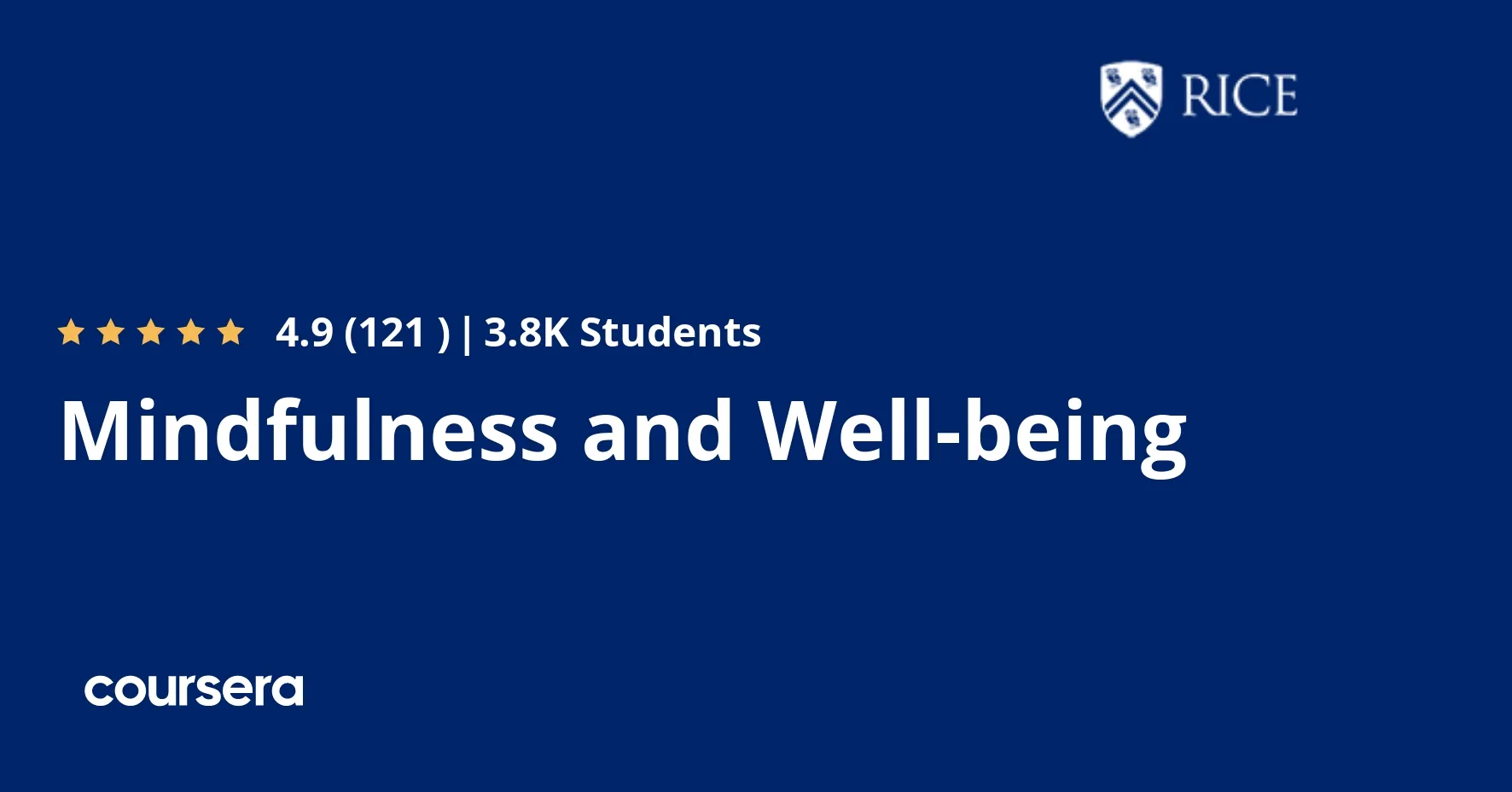
Mindfulness and Well-being 
Explore the benefits of mindfulness and how it can be used to improve overall well-being. Learn how to apply mindfulness techniques to everyday life and cultivate a greater sense of peace and contentment. ▼
ADVERTISEMENT
Course Feature
![]() Cost:
Cost:
Free Trial
![]() Provider:
Provider:
Coursera
![]() Certificate:
Certificate:
No Information
![]() Language:
Language:
English
Course Overview
❗The content presented here is sourced directly from Coursera platform. For comprehensive course details, including enrollment information, simply click on the 'Go to class' link on our website.
Updated in [March 06th, 2023]
1. You can learn the theory and practice of mindfulness, and how to incorporate it into your life. You can gain knowledge of key mindfulness concepts and practices that help you use your attention more effectively, and understand the mind/body connection and how the body serves as a direct portal to presence.
2. You can learn how to be more mindful in your daily life, and how to use mindfulness to reduce stress and anxiety. You can also learn how to use mindfulness to cultivate a sense of well-being and inner peace. You can gain insight into how to use mindfulness to create a more meaningful and fulfilling life.
3. You can learn how to use mindfulness to cultivate self-awareness and self-compassion. You can gain insight into how to use mindfulness to cultivate a sense of connection with yourself and others. You can also learn how to use mindfulness to cultivate a sense of gratitude and appreciation for life.
4. You can learn how to use mindfulness to cultivate a sense of purpose and meaning in life. You can gain insight into how to use mindfulness to create a more meaningful and fulfilling life. You can also learn how to use mindfulness to cultivate a sense of joy and contentment.
[Applications]
After this course, participants are encouraged to apply the concepts and practises of mindfulness to their daily lives. They can use the tools and methods learned to become more aware of their thoughts, feelings, and physical sensations. They can also use the mindfulness practises to become more present in their lives and to cultivate a greater sense of well-being. Additionally, participants can use the mindfulness practises to develop a deeper understanding of the mind/body connection and to become more aware of how their body can serve as a direct portal to presence.
[Career Paths]
1. Mindfulness Coach: Mindfulness coaches help individuals and organizations to develop and maintain a mindful lifestyle. They provide guidance and support to help individuals and organizations to become more mindful and to use mindfulness to improve their overall well-being. The demand for mindfulness coaches is growing as more people become aware of the benefits of mindfulness and its potential to improve their lives.
2. Mental Health Counselor: Mental health counselors use mindfulness-based approaches to help individuals and groups to manage stress, anxiety, depression, and other mental health issues. They provide counseling and support to help individuals to develop coping strategies and to build resilience. Mental health counselors are in high demand as more people seek help for mental health issues.
3. Mindfulness Educator: Mindfulness educators teach mindfulness-based courses and workshops to individuals and organizations. They provide instruction on mindfulness concepts and practises, and help individuals to develop their own mindfulness practice. Mindfulness educators are in high demand as more people become aware of the benefits of mindfulness and its potential to improve their lives.
4. Mindfulness Researcher: Mindfulness researchers study the effects of mindfulness on mental and physical health. They conduct research to understand how mindfulness can be used to improve well-being and to develop new interventions and treatments. Mindfulness researchers are in high demand as more organizations and institutions recognize the potential of mindfulness to improve health and well-being.
[Education Paths]
1. Bachelor of Science in Psychology: This degree path focuses on the study of the mind and behavior, and provides a comprehensive understanding of the psychological processes that underlie human behavior. It also covers topics such as cognitive psychology, social psychology, and developmental psychology. This degree path is ideal for those interested in exploring the science of mindfulness and well-being, as it provides a strong foundation in the scientific principles of psychology. Additionally, the degree path is becoming increasingly popular as the demand for mental health professionals continues to grow.
2. Master of Science in Clinical Mental Health Counseling: This degree path focuses on the application of psychological principles to the treatment of mental health issues. It provides a comprehensive understanding of the theories and techniques used in counseling, as well as the ethical and legal considerations involved in the practice of counseling. This degree path is ideal for those interested in exploring the therapeutic aspects of mindfulness and well-being, as it provides a strong foundation in the principles of counseling and psychotherapy.
3. Doctor of Philosophy in Mindfulness and Well-being: This degree path focuses on the study of the science of mindfulness and well-being, and provides a comprehensive understanding of the psychological, physiological, and spiritual aspects of this field. It covers topics such as the neuroscience of mindfulness, the psychology of well-being, and the application of mindfulness in clinical settings. This degree path is ideal for those interested in exploring the science of mindfulness and well-being, as it provides a strong foundation in the scientific principles of this field. Additionally, the degree path is becoming increasingly popular as the demand for professionals in this field continues to grow.
4. Master of Arts in Mindfulness and Well-being: This degree path focuses on the study of the theory and practice of mindfulness and well-being, and provides a comprehensive understanding of the principles and techniques used in this field. It covers topics such as the neuroscience of mindfulness, the psychology of well-being, and the application of mindfulness in clinical settings. This degree path is ideal for those interested in exploring the therapeutic aspects of mindfulness and well-being, as it provides a strong foundation in the principles of this field. Additionally, the degree path is becoming increasingly popular as the demand for professionals in this field continues to grow.
Course Syllabus
Mindfulness and Well-being: Foundations
Mindfulness and Well-being: Living with Balance and Ease
Mindfulness and Well-being: Peace in, Peace Out
Course Provider

Provider Coursera's Stats at AZClass
Discussion and Reviews
0.0 (Based on 0 reviews)
Explore Similar Online Courses

Perform Foundational Data ML and AI Tasks in Google Cloud

Introduction to Programming for Musicians and Digital Artists

Python for Informatics: Exploring Information

Social Network Analysis

Introduction to Systematic Review and Meta-Analysis

The Analytics Edge

DCO042 - Python For Informatics

Causal Diagrams: Draw Your Assumptions Before Your Conclusions

Whole genome sequencing of bacterial genomes - tools and applications

Mindfulness: What It Is Where It Comes From and How to Practice It

Free Meditation Tutorial - Mindfulness Meditation: The Science And Practice


Start your review of Mindfulness and Well-being